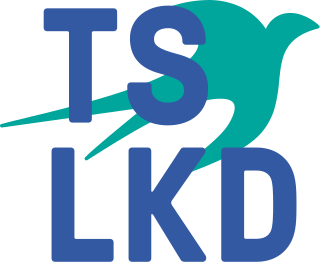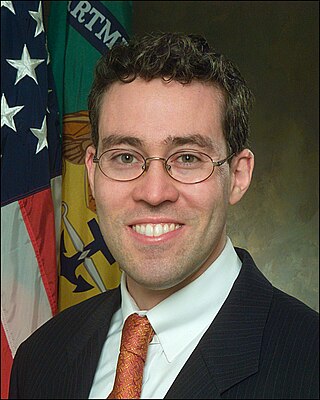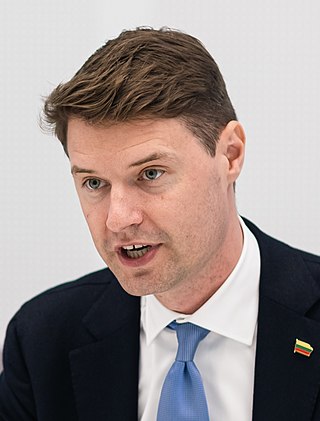
The Homeland Union –Lithuanian Christian Democrats,also colloquially known as the Conservatives,is a centre-right political party in Lithuania. It has 18,000 members and 28 of 141 seats in the Seimas. Its current leader is Gabrielius Landsbergis,who replaced Andrius Kubilius in 2015. It is a member of the European People's Party (EPP) and the International Democracy Union (IDU).

Valdis Dombrovskis is a Latvian politician serving as Executive Vice President of the European Commission for An Economy that Works for People since 2019 and European Commissioner for Trade since 2020. He previously served as European Commissioner for Financial Stability,Financial Services and Capital Markets Union from 2016 to 2020 and Prime Minister of Latvia from 2009 to 2014.

Irena Degutienė is a Lithuanian politician and member of the conservative Homeland Union. She is currently the Deputy Speaker of Seimas,and was twice the acting Prime Minister of Lithuania,first from 4 May 1999 to 18 May 1999 and then from 27 October 1999 to 3 November 1999. She has also been the Speaker of Seimas from 15 September 2009 to 14 September 2012,as well as Minister for Social Security and Labour from 1996 to 2000. In 1978,she graduated from Vilnius University with a degree in medicine. For almost twenty years,she worked in Vilnius Red Cross Hospital before becoming a secretary in the Ministry of Health in 1994. She was initially elected to Seimas in 1996. Degutienėis the first woman to be Speaker of Seimas in Lithuania's history.

The Federal Financial Supervisory Authority,better known by its abbreviation BaFin,is Germany's integrated financial regulatory authority. Since 2014,it has been Germany's national competent authority within European Banking Supervision. It is an independent federal institution with headquarters in Bonn and Frankfurt and falls under the supervision of the Federal Ministry of Finance. BaFin supervises about 2,700 banks,800 financial services institutions,and over 700 insurance undertakings.
Wirecard AG is an insolvent German payment processor and financial services provider whose former CEO,COO,two board members,and other executives have been arrested or otherwise implicated in criminal proceedings. In June 2020,the company announced that €1.9 billion in cash was missing. It owed €3.2 billion in debt. In November 2020,the company was dismantled after it sold the assets of its main business unit to Santander Group for €100 million. Other assets,including its North American,UK and Brazilian units had been previously sold at nondisclosed prices. The company offered electronic payment transaction services and risk management,and issued and processed physical and virtual cards. As of 2017,the company was listed on the Frankfurt Stock Exchange,and was a part of the DAX stock index from September 2018 to August 2020.

Gabrielius Landsbergis is a Lithuanian politician serving as the current Lithuanian minister of Foreign Affairs since 2020 in the ŠimonytėCabinet. A member of the Seimas for the Žaliakalnis constituency,incumbent President of the Committee of Ministers of the Council of Europe and a former member of the European Parliament with the Group of the European People's Party. He has been the Chairman of the Homeland Union since 2015.
The Sixth Seimas of Lithuania was the first parliament (Seimas) elected in Lithuania after it restored independence on 11 March 1990. Elections took place on 25 October 1992,with the second round on 15 November. In a surprisingly decisive outcome,the elections were won by Democratic Labour Party of Lithuania (LDDP),with 73 seats. The result reflected widespread dissatisfaction with the economic situation and the policies of the ruling Sąjūdis political movement in the preceding Supreme Council of Lithuania.

The Second Brazauskas Cabinet was the 13th cabinet of Lithuania since 1990. It consisted of the Prime Minister and 13 government ministers.

Saulius Skvernelis is a Lithuanian politician who served as prime minister of Lithuania between 2016 and 2020. He had previously served as police commissioner,and was Minister of the Interior from 2014 to 2016. Though he was an independent politician,he was backed by the Lithuanian Farmers and Greens Union and was a member of its parliamentary group until 2022,as a result of which he became the first head of government in European history primarily backed by a green party.

Wopke Bastiaan Hoekstra is a Dutch politician. He served as second Deputy Prime Minister of the Netherlands and Minister of Foreign Affairs in the fourth Rutte cabinet between 10 January 2022 and 1 September 2023. Hoekstra previously served as Minister of Finance in the third Rutte cabinet from 2017 to 2022 and Leader of the Christian Democratic Appeal (CDA) from 2020 to 2023. In 2023,he was nominated to take on the role of Frans Timmermans as EU Commissioner,being responsible for climate action. On the 22nd of July 2024 it was announced that Hoekstra is nominated for a new term of EU Commissioner on behalf of the Schoof cabinet.

Markus Braun is an Austrian tech investor,the former CEO and CTO at the now insolvent payment processor,Wirecard AG from January 2002 until his resignation and arrest in June 2020. Braun stepped down from Wirecard amidst fraud allegations,but has denied any wrongdoing. On December 8,2022,the criminal proceedings against him and two other former Wirecard managers began at the Munich regional court. Court cases were pending as of 2024.

The Danske Bank money laundering scandal arose in 2017-2018,when it became known that around €800 billion of suspicious transactions had flowed from Estonian,Russian,Latvian and other sources through the Estonia-based bank branch of Denmark-based Danske Bank from 2007 to 2015. It has been described as possibly the largest money laundering scandal ever in Europe,and as possibly the largest in world history. It includes incoming funds from Estonia (23%),Russia (23%),Latvia (12%),Cyprus (9%),UK (4%) and others. Outgoing funds were distributed between Estonia (15%),Latvia (14%),China (7%),Switzerland (6%),Turkey (6%) and others (52%)

AušrinėArmonaitė is a Lithuanian politician who served as the chairperson of the Freedom Party from 2019 to 2024. Previously a member of the Liberal Movement and a vice chairperson from 2017 until 2018,Armonaitėwas first elected to the Seimas in the 2016 parliamentary election. In 2018,she resigned from the Liberal Movement and later joined the social liberal and progressive Freedom Party. She led the party into the 2020 parliamentary election,where the party won 11 seats and became represented in the Seimas for the first time.
Stasys Jakeliūnas is a Lithuanian politician. He was formerly a Member of the European Parliament (EP) for the populist Lithuanian Farmers and Greens Union. Jakeliūnas has previously spent one incomplete term as MP at the Lithuanian Seimas,having been elected in 2016.

Danyal Bayaz is a German politician of Alliance 90/The Greens who has been serving as State Minister of Finance in the government of Minister-President of Baden-Württemberg Winfried Kretschmann since May 2021. From 2017 until 2021,he was a member of the Bundestag.

The Wirecard scandal was a series of corrupt business practices and fraudulent financial reporting that led to the insolvency of Wirecard,a payment processor and financial services provider,headquartered in Munich,Germany. The company was part of the DAX index. They offered customers electronic payment transaction and risk management services,as well as the issuance and processing of physical cards. The subsidiary,Wirecard Bank AG,held a banking license and had contracts with multiple international financial services companies.

James H. Freis Jr. is an American lawyer and financial industry executive who from 2007 to 2012 served as the United States Department of the Treasury's 6th Director of the Financial Crimes Enforcement Network (FinCEN),where he expanded the scope of the anti-money laundering regulations and became known for spearheading efforts to combat fraud and implementing modern data analysis. He was an attorney and central banker at the Federal Reserve Bank of New York and the Bank for International Settlements.

Mykolas Majauskas is a Lithuanian public person,a former Chair of Finance Committee and member of the Seimas,a former Vilnius city councillor and former Lithuania Government Official. He has resigned from the Parliament Finance committee after refusing to vote for tax increases and therefore was expelled from Homeland Union in November 2022. Mykolas has been approved by the Central Bank of Lithuania as a board member of one of the leading real estate fund management companies and elected as President of Crypto Economy Organisation.

Parliamentary elections were held in Lithuania on 13 and 27 October 2024 to elect the 141 members of the Seimas. Parliament members were elected in 71 single-member constituencies using the two-round system,and the remaining 70 in a single nationwide constituency using proportional representation. The first round was held on 13 October and the second round on 27 October.
















